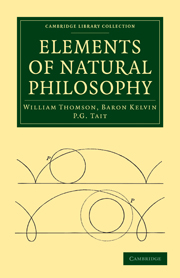CHAP. VI - STATICS OF A PARTICLE. ATTRACTION
from DIVISION II - ABSTRACT DYNAMICS
Published online by Cambridge University Press: 10 November 2010
Summary
407. We naturally divide Statics into two parts–the equilibrium of a Particle, and that of a rigid or elastic Body or System of Particles whether solid or fluid. The second law of motion suffices for one part–for the other, the third, and its consequences pointed out by Newton, are necessary. In the succeeding sections we shall dispose of the first of these parts, and the rest of this chapter will be devoted to a digression on the important subject of Attraction.
408. By § 221, forces acting at the same point, or on the same material particle, are to be compounded by the same laws as velocities. Therefore the sum of their resolved parts in any direction must vanish if there is equilibrium; whence the necessary and sufficient conditions.
They follow also directly from Newton's statement with regard to work, if we suppose the particle to have any velocity, constant in direction and magnitude (and § 211, this is the most general supposition we can make, since absolute rest has for us no meaning). For the work done in any time is the product of the displacement during that time into the algebraic sum of the effective components of the applied forces, and there is no change of kinetic energy. Hence this sum must vanish for every direction.
- Type
- Chapter
- Information
- Elements of Natural Philosophy , pp. 134 - 192Publisher: Cambridge University PressPrint publication year: 2010First published in: 1873

